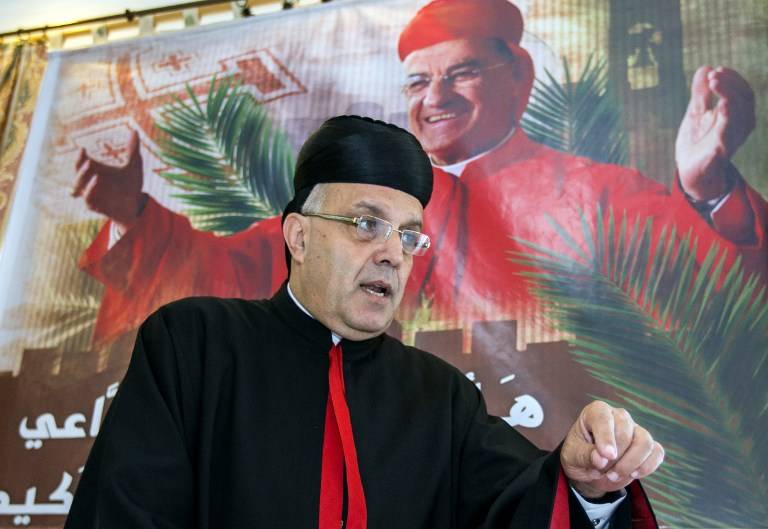
Maronite Archbishop of Haifa and the Holy Land Moussa al-Hage gestures during a press conference at his house in Haifa on May 14, 2014. (Credit: Jack Guez/AFP)
On Monday, the Maronite Archbishop of Haifa and the Holy Land, Moussa al-Hage, arrived at the Naquoura crossing in Lebanon from his episcopal see in Haifa, where he was arrested by the Lebanese General Security in Lebanon. The border point of Naqoura is reserved from the passage of clerics and diplomatic corps.
The timing of this unprecedented incident indicates that Hezbollah wanted to send a message to Maronite Patriarch Bechara al-Rai.
According to information obtained by L’Orient-Le Jour, the prelate was questioned at length about his relationship with the Lebanese community that took refuge in Israel after the withdrawal of the Israeli army from the border strip it controlled in May 2000.
Arriving at around 11:30 a.m. at the border point, the bishop was interrogated for eleven hours before being released, according to the state-sponsored National News Agency.
His passport was confiscated, but he was able to continue his journey thanks to the intervention of the Maronite Patriarch and the President of the Supreme Judicial Council, Souheil Abboud.
Hage, however, must appear today before the military court.
According to the same source, the General Security confiscated, after a thorough search of his belongings, the money (more than $500,000) pledged to the bishop by the Lebanese who fled to Israel as well as a large batch of medicines that he was also carrying to the families who remained in Lebanon.
It is known that if these Lebanese fugitives decide to return to Lebanon, they will face various prison sentences, depending on whether they have blood on their hands or not, as they are all presumed to have collaborated with the Israeli army.
L’Orient-Le Jour tried reaching out to the General Security, to no avail.
Arrest warrant of Judge Fadi Akiki
The bishop’s vehicle was stopped en route in Naqoura as per an arrest warrant by the military investigating judge, Fadi Akiki.
Akiki, who is married to the niece of Parliament Speaker and Amal leader Nabih Berri, had previously questioned the Maronite Bishop of Haifa on the nature of the links maintained by the church with the Lebanese refugee community in the Galilee, according to an ecclesiastical source who spoke to L’Orient-Le Jour.
The bishop had then strongly denounced the suspicions brought against him by the military justice system, maintaining that his mission is purely humanitarian and should allow families separated by the war to remain in contact with each other, in the hope of being able to return to the country one day, and to register the births of their children — a right they are deprived of, but which is crucial for succession.
L'Orient-Le Jour has learned that the Druze Sheikh Akl Sami Abi al-Muna contacted Patriarch Rai yesterday to denounce the incident.
The money given as a pledge to the bishop was not exclusively intended for Maronites, but also for Druze and Shiite families.
In view of the seriousness of the situation, Rai decided yesterday to postpone the response, pending today’s closed meeting of Maronite synod, which will respond appropriately to this incident that seriously deviated from the ethical rules that have always governed the relationship between the Lebanese state and the Maronite church.
A recognized right
The Maronite archbishop of Haifa, who has been in office since September 2012, travels by road between the Holy Land and Lebanon by virtue of a general right recognized for all Christian ecclesiastical figures who serve parishes and dioceses in the Holy Land.
This was not an exception, confirmed the Maronite Patriarchal Vicar, Bishop Boulos Sayah, who had been Bishop of Haifa for 16 years, assuring L’Orient-Le Jour that he never had any problems during his travels.
The incident seems to be an eminently political matter, in a context where the Maronite patriarch is multiplying his criticism of Hezbollah.
The “message” from Hezbollah would impact the “neutrality of Lebanon” for which the patriarch is campaigning, and which the party considers to be directed against it, as well as Rai’s positions on who will be the next president.
The head of the Maronite Church said that the new president should be “above political and partisan alignments” — a condition that seems to exclude from the presidential race both the head of the Marada Movement, Sleiman Frangieh, and the leader of Free Patriotic Movement Gebran Bassil, the two current "protégés” of the pro-Iranian party.
The recent rapprochement between the two men was prompted by Hezbollah leader Hassan Nasrallah.
The bishop’s arrest could also be viewed in the context of a settlement of accounts between Hezbollah and Rai. The latter visited Jerusalem in 2014 to meet with Pope Francis, before making a pastoral tour of the Galilee to visit the dioceses, Maronite convent and parishes, much to the displeasure of the pro-Iranian party, which deemed the visit as a form of “normalization” between Lebanon and Israel.
Lebanese Forces leader Samir Geagea also reacted to the incident and asked the Supreme Judicial Council president and Ghassan Oueiedat, the country’s chief prosecutor to cancel the military court’s subpoena issued against Hage.
Geagea also argued that the real objective of the action against the Maronite bishop is the "patriarch and his patriotic positions.”
Former MP Fares Souhaid also reacted in solidarity with the Maronite patriarchal seat.
This article was originally published in French with L'Orient-Le Jour. Translation by Sahar Ghoussoub.